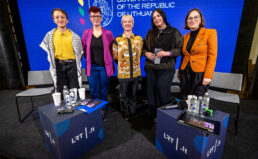On January 8th, 2016 the National LGBT* rights organization LGL visited the Equal Opportunities Ombudsman’s Office of the Republic of Lithuania to host a training “Protection against Discrimination on the Grounds of Gender Identity and Gender Expression: Luxury or Necessity?” for the Office’s lawyers and staff.
During the training in the Equal Opportunities Ombudsman’s Office LGL’s Policy Coordinator (Human Rights) Tomas Vytautas Raskevičius presented a complex approach on transgender persons’ human rights issues, stressing the need to create quick, transparent and accessible legal gender recognition procedure in Lithuania, encompassing not only the possibility of changing one’s identity documents, but also the provision of appropriate health care services tailored to the specific needs of transgender individuals.
At the moment Lithuania is the only member state within the framework of the Council of Europe, which does not provide for either de facto or de jure procedure of gender reassignment. In order to change one’s identity documents, transgender people are forced to undergo the full gender reassignment procedure, including, inter alia, the ultimate gender reassignment surgery. The fact that not all transgender people want to change their gender surgically is being ignored. However, the corresponding identity documents are necessary for all transgender individuals with the view of leading social life free of discrimination, harassment and violence.
Currently seventeen European countries – including Estonia, Finland, Sweden and Denmark – provide for the possibility of legal gender recognition without the compulsory requirement of gender reassignment surgery. The analogous position was articulated by the Parliamentary Assembly of the Council of Europe in its Resolution 2048 (2015)The Human Rights Commissioner of the Council of Europe recommended in the Human Rights and Gender identity Issue paper of 2009 that sterilisation and other compulsory medical treatment as a necessary legal requirement to recognise a person’s gender identity in laws regulating the process for name and sex change should be abolished. He also recommended that gender reassignment procedures, such as hormone treatment, surgery and psychological support should be made accessible for transgender persons.
Specific examples of discrimination affecting transgender persons in Lithuania, i.e. harassment in the field of employment or direct discrimination in service sector, were given during LGL’s training for the lawyers and staff of the Equal Opportunities Ombudsman’s Office. According to the EU Agency for Fundamental Rights (FRA), as many as 60 % of transgender individuals in Lithuania have experienced physical or sexual violence and harassment in the course of the last five years. Therefore, transgender individuals remain to be one of the most socially vulnerable and discriminated social groups in our country.
The national LGBT* rights organization LGL hopes that the Equal Opportunities Ombudsman’s Office of the Republic of Lithuania will continue to develop a constructive dialogue with non-governmental organizations, representing the interests of trans community. We hope that, according to the jurisprudence of the European Court of Justice, a principled position that discrimination of transgender persons is discrimination on the grounds of gender will be formulated in the context of the implementation of the main functions of the Equal Opportunities Ombudsman’s Office.










